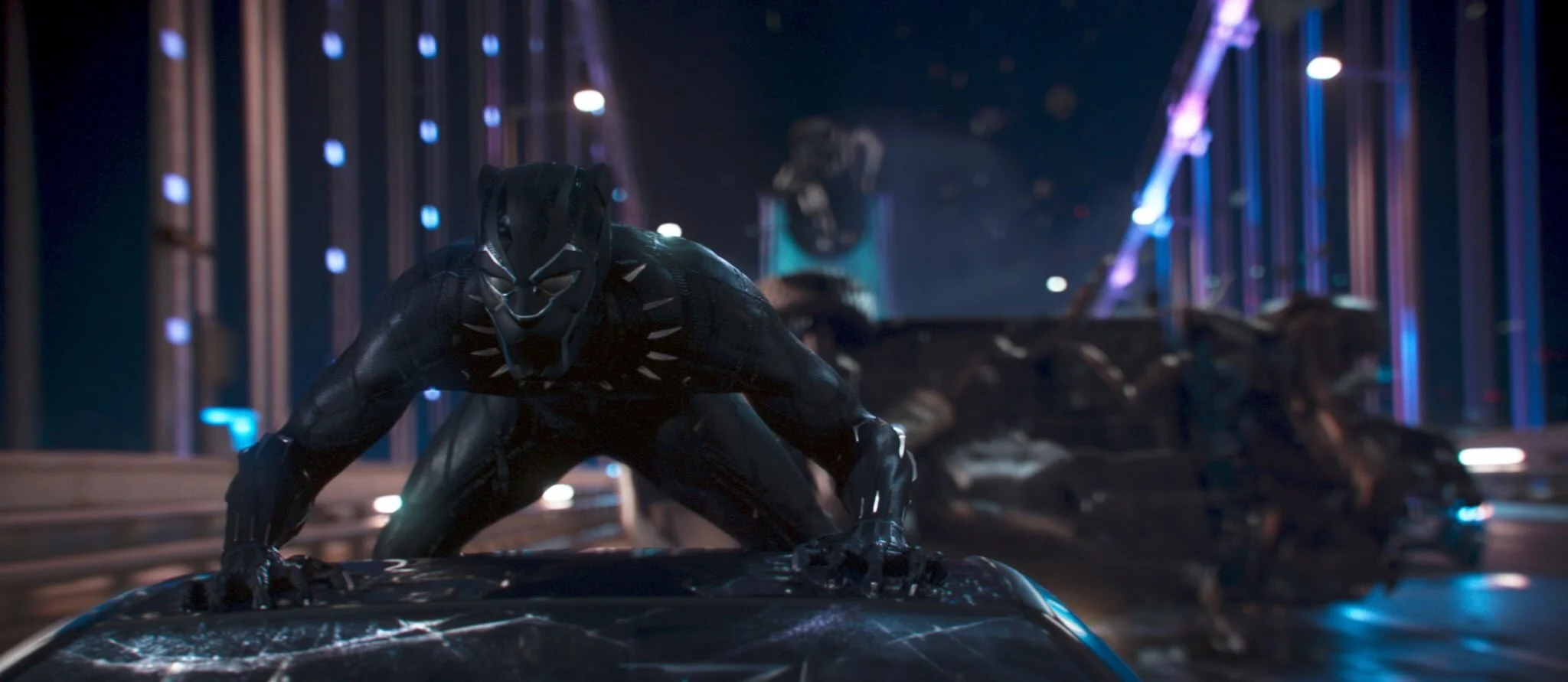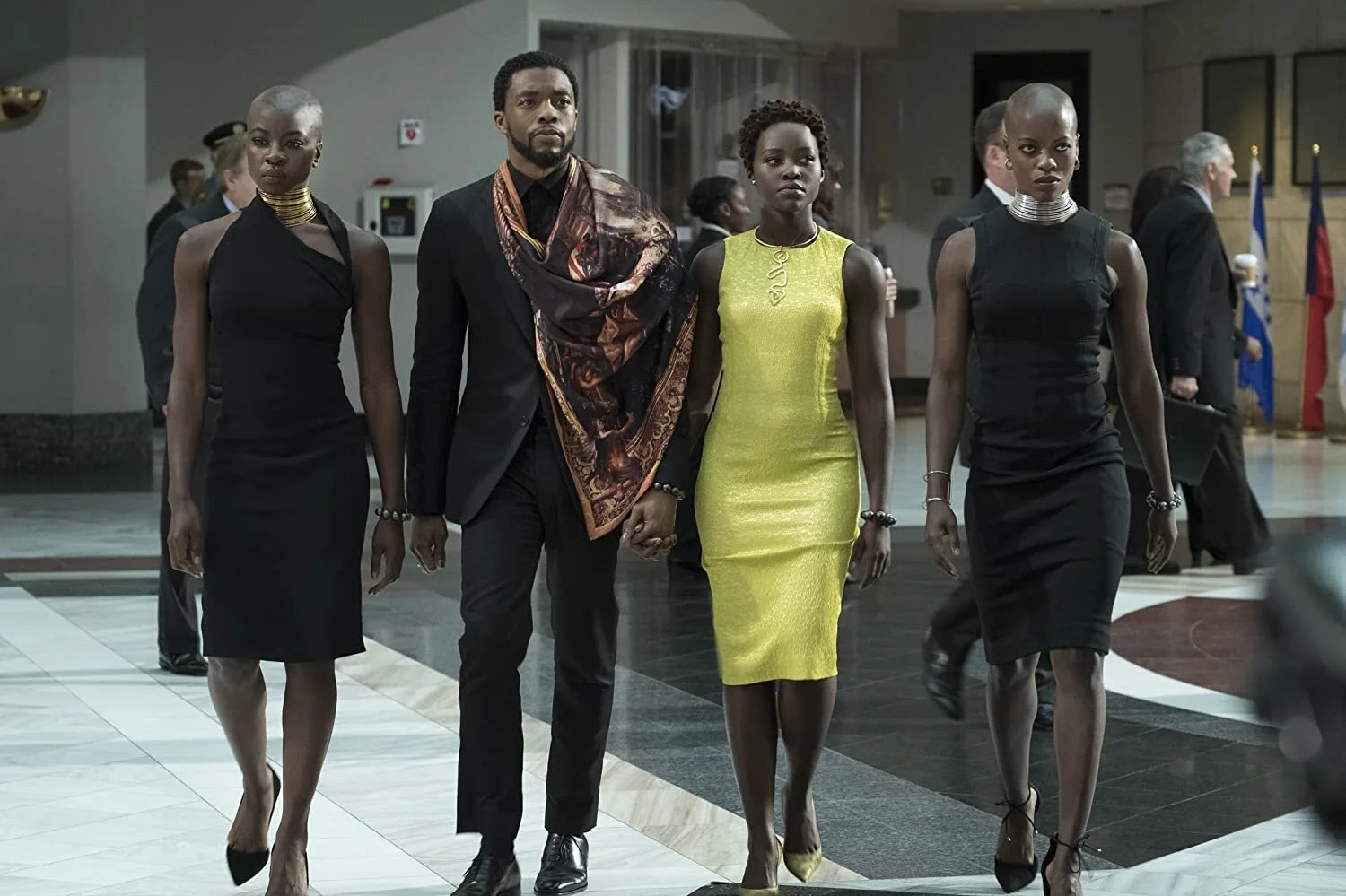T’Challa Lives
You know there must be something special about a superhero movie, an action superhero movie at that, to get my mother to see that movie. And not just once. By my count, she’s seen Black Panther no fewer than seven times in theaters, and another five since it came to the smaller screen. When I set her up with a smart TV, after a two hour and fifteen minute deep deliberation with popcorn, she deemed my newfangled Christmas gift worthy.
Opening to the tune of $292 million in its initial seven-day run domestically in 2018, Black Panther has cumulatively grossed a staggering $1.3 billion worldwide. “We had to maintain the lie,” says the wise Zuri (Forest Whitaker) when a bombshell about the past is exposed. Well, the lie that a predominantly-black film can’t travel and resonate in every corner of this Earth the same way that black music has, and black athletes have, has been upended once and for all.
Like almost all other Marvel films last decade, Black Panther is vast with many moving parts, worlds, and characters. But Black Panther is also deeply specific, perhaps unlike any superhero film ever. Consider that before we ever lay eyes on Wakanda, a prosperous African nation, we begin in Oakland, California, birthplace of the Black Panther Party and an important site of early conscious rappers like Paris, who in his 1992 classic Days of Old, proclaims:
Kings and Queens were the names of the righteous
but the sons of slaves are insane and we might just
self-destruct and erupt without a chance to grow
This ain't the days of old
This twoness, of black American and African is personal to me — the son of a Nigerian father and a black American mother, both born in shacks, one under British rule in a city once a sanctuary from slave hunters, and the other on sharecropping farm in the belly of Jim Crow. It is also personal to director Ryan Coogler, who begins the film firmly planted in his native 510. A young Erik Killmonger (Michael B. Jordan), and a bunch of other boys play ball while a betrayal takes place in the projects above. The late King T'Chaka (John Kani) kills his own brother N'Jobu (Sterling K. Brown), who’s been working undercover far outside of Wakanda’s walls.
Pay attention to Coogler’s timely reaction shots for his black male characters, tracking their eyes, and their longing. Look at young Killmonger’s curiosity when that mysterious “Bugatti spaceship” disappears into the clouds for the first time. 90s hood films like Boyz n the Hood and Menace II Society were applauded for their raw and unflinching depiction of inner city life, but they’re also about what happens when the Rickys and the Doughboys have their interior worlds stripped from them.
In some ways, Black Panther is that coming of age story, with T’Challa assuming the throne maybe before he’s fully ready. Fortunately, he has plenty of capable allies around him, particularly black women, who assume groundbreaking centrality in this film from nearly the very start. There’s warrior leader Okoye (Danai Gurira), spy and T’Challa’s ex Nakia (Lupita Nyong'o), and punny tech maven Shuri (Letitia Wright), my favorite.
Some of these rites of passage scenes are far from new, including a challenge scene where T’Challa ends up fighting the towering M'Baku (Winston Duke), ruler of the Jabari who live in the snowy mountain hinterland. Still part of what stands out here are the incredible array of costumes, accents, and sounds from Igbo and pidgin to Xhosa — the Pan Africanist’s nirvana or maybe better put Monrovia.
T’Challa’s first mission takes him to South Korea to avenge his father’s death. He and team are on the hunt for black-market arms dealer Ulysses Klaue (Andy Serkis), who assassinated T’Chaka. These scenes play out like a certain jet-setting espionage franchise, and Boseman, in addition to everything else he achieved in his final four years, might have also been the first black James Bond.
Coogler, and black folk at large, don’t get enough credit for combining nerdy and cool, and that’s exactly how these sequences go. From Shuri’s lab of gadgets and calling out a king for wearing bodega slippers — “what are those?!” — to Okoye’s Vibranium Spear, and upbeat African pop, there’s so much fun stuff here. And while these are heroes, royal heroes at that, we also see their human flaws and imperfections. The stylish Nakia, for instance, hits the gas barefoot. To be sure, Wakanda is a strong and stunning utopia, but it’s not necessarily gilded either.
This latest wave of black representation in film and television has focused on mighty individuals including Martin Luther King Jr., as well as Katherine Johnson, Dorothy Vaughan and Mary Jackson of Hidden Figures. But many of these films, in a departure from much of the American film canon, also speak to the power of the collective.
When Ulysses Klaue goes down, the film shifts from what happens outside of Wakanda’s walls to what happens within. Killmonger, not Klaue, is the true villain of this film, but again, in an unusual move, Killmonger is no ordinary antagonist. In fact, T’Challa and Killmonger is yet just a continuation of Martin and Malcolm, which is a continuation of DuBois and Booker T. Washington. And so on. These internecine debates are age-old, but never before have they been on display to this many people, all the while being packaged through seductive entertainment. The subtext is there, but you don’t even have to know about any of this history in order to enjoy the film one bit.
This speaks to another truth that Black Panther, Coogler, Boseman and the rest of the cast and crew helped surface. If this artistic maxim is true, that the more specific something is, the more universal it is, then this must also apply to black art.
While there’s still plenty of action in the second half of Black Panther, particularly the culminating action scene that takes place on a massive field, in the skies, and down below in the train system, these set pieces aren’t quite exciting as what we saw in the first half. However, what’s going on underneath the surface is where the gold is, and that’s precisely because of the film’s specificity and depth.
I mean, it’s not every day that a superhero villain cries out: “Bury me in the ocean with my ancestors who jumped from the ships, because they knew death was better than bondage.”
With all eyes on Boseman and Black Panther again, it’s also important to note that while these depictions might be new for a Hollywood blockbuster, they are not without precedent. And while other pieces have rightfully pointed to the African and Afro-futurist traditions here, I also see Black Panther firmly rooted in the unique culture and history of black Americans.
Indeed, there’s a rich and unheralded black American utopian tradition I’ve written about, including real life towns Allensworth, California and Boley, Oklahoma, and many others created as a refuge when the promise of Reconstruction gave way to the betrayal of Jim Crow. These real life spaces were also (re)imagined through art, including Texan Sutton E. Griggs’ hallmark novel Imperium in Imperio (1899), about a black-helmed shadow state within Texas. Much like T’Challa and Killmonger, central characters Belton and Bernard represent two ideological approaches to getting free, one with the more moderate approach, and the other with the more militant strategy.
In Black Panther, T’Challa uses the ancestral plane to connect with his past and draw guidance on how to lead Wakanda into a new future. Increasingly, what he finds out about his past and his father isn’t always rosy. But he ultimately learns that he must face history squarely in order to learn from it. Notably, when Killmonger takes over, he has a violent reaction to his vision, and without anyone to lean on for support, never mind parse out the imagery, just decides to set fire to tradition.
T’Challa, Black Panther, the Howard Bison, Chadwick Boseman is part of our history now, helping usher in a new era of representation that has allowed us to see ourselves more fully.
****.5 outta *****


